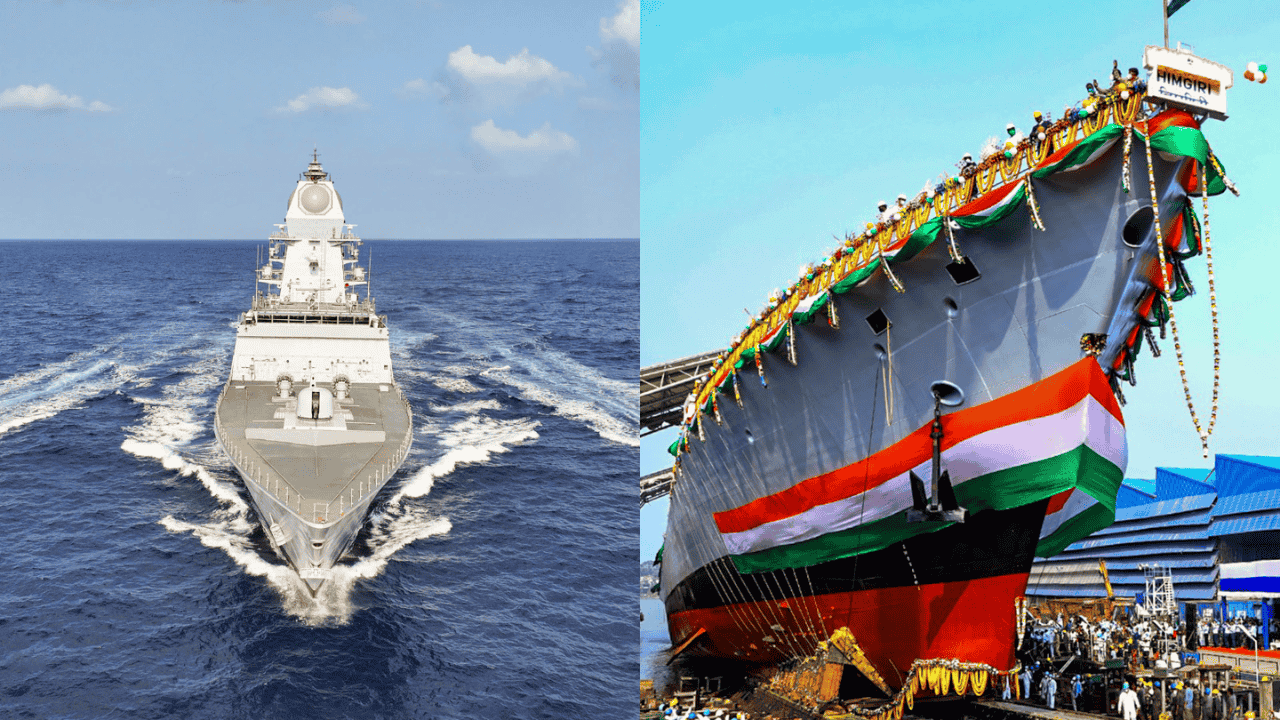Historic Twin Commissioning Strengthens India's Naval Power
Defense Minister Rajnath Singh commissioned two indigenous multi-mission stealth frigates - INS Udaygiri and INS Himgiri - into the Indian Navy on Tuesday, August 26, 2025, at the Naval Dockyard in Visakhapatnam. This marks the first time in Indian naval history that two warships have been commissioned simultaneously, significantly enhancing India's maritime capabilities in the strategic Indo-Pacific region.
Key Features of INS Udaygiri and INS Himgiri
Project 17A Nilgiri-Class Specifications
Both frigates belong to the Project 17A Nilgiri-class and represent the next generation of Indian naval warfare capabilities:
Technical Specifications:
Length: 149 meters
Displacement: 6,670 tonnes
Speed: Over 28 knots
Crew: 200 personnel
Advanced stealth technology making them nearly invisible to enemy radar, infrared, and acoustic sensors
Advanced Weapon Systems
The frigates are equipped with cutting-edge armaments:
BrahMos supersonic cruise missiles - capable of striking targets at over 290 km range
Barak-8 Long Range Surface-to-Air Missile (LRSAM) system - developed jointly by India and Israel
Anti-submarine torpedoes for underwater warfare capabilities
76mm Super Rapid Gun Mount for surface engagements
Integrated combat management system for coordinated operations
Indigenous Manufacturing Excellence
Aatmanirbhar Bharat in Action
The commissioning highlights India's growing self-reliance in defense manufacturing:
INS Himgiri: Built by Garden Reach Shipbuilders & Engineers (GRSE), Kolkata
INS Udaygiri: Constructed by Mazagon Dock Shipbuilders Limited (MDL), Mumbai
Both ships feature 75% indigenous content
Part of the ₹45,000 crore Project 17A program
Defense Minister Rajnath Singh emphasized that all future warships will be built in India, reinforcing the government's commitment to indigenous defense production.
Strategic Significance for Indo-Pacific Security
Maritime Domain Dominance
The deployment of these frigates in the Indo-Pacific region serves multiple strategic purposes:
Countering Chinese naval expansion in the Indian Ocean Region
Protecting vital sea lanes through which 60% of global maritime trade passes
Strengthening India's position as a net security provider in the Indo-Pacific
Enhancing deterrence capabilities against potential maritime threats
Regional Security Architecture
These frigates will play crucial roles in:
Quad maritime cooperation exercises with US, Japan, and Australia
Anti-piracy operations in the Arabian Sea and Indian Ocean
Humanitarian assistance and disaster relief missions
Freedom of navigation operations in international waters
Project 17A: Complete Fleet Status
The Project 17A program encompasses seven advanced frigates:
Commissioned Ships:
INS Nilgiri (April 2023)
INS Udaygiri (August 2025)
INS Himgiri (August 2025)
Under Construction:
Four additional frigates at various stages of completion
Expected commissioning by 2027-2028
Technology and Innovation Highlights
Stealth Capabilities
The frigates incorporate state-of-the-art stealth features:
Reduced radar cross-section through angular design
Infrared signature suppression systems
Acoustic dampening for submarine detection avoidance
Advanced electronic warfare suites
Combat Management Systems
Both ships feature integrated combat management systems enabling:
Real-time threat assessment and response
Multi-platform coordination capabilities
Advanced sensor integration
Network-centric warfare capabilities
Why This Matters for Your Exam Preparation
This development is highly significant for UPSC and competitive exam aspirants across multiple dimensions:
Defense & Security (GS Paper 3):
Understanding India's indigenous defense capabilities and Aatmanirbhar Bharat initiative
Knowledge of advanced missile systems (BrahMos, Barak-8) and their strategic importance
Maritime security challenges in the Indo-Pacific region
International Relations (GS Paper 2):
India's strategic partnerships with Israel (Barak-8 missile system)
Quad cooperation and Indo-Pacific strategy
India-China maritime competition dynamics
Geography (GS Paper 1):
Strategic importance of Indian Ocean sea lanes
Visakhapatnam's role as India's submarine and naval hub
Understanding maritime chokepoints and trade routes
Current Affairs Integration:
Recent developments in China's naval expansion (String of Pearls strategy)
India's response through indigenous shipbuilding capabilities
Defense budget allocation trends and Make in India success stories
Essay and Ethics Applications:
Indigenous innovation versus import dependency
Strategic autonomy in defense manufacturing
Technology transfer and international cooperation models
Expected Questions:
Analyze the significance of Project 17A frigates in India's maritime security strategy
Discuss the role of indigenous defense production in achieving strategic autonomy
Evaluate India's Indo-Pacific strategy in the context of regional security challenges







